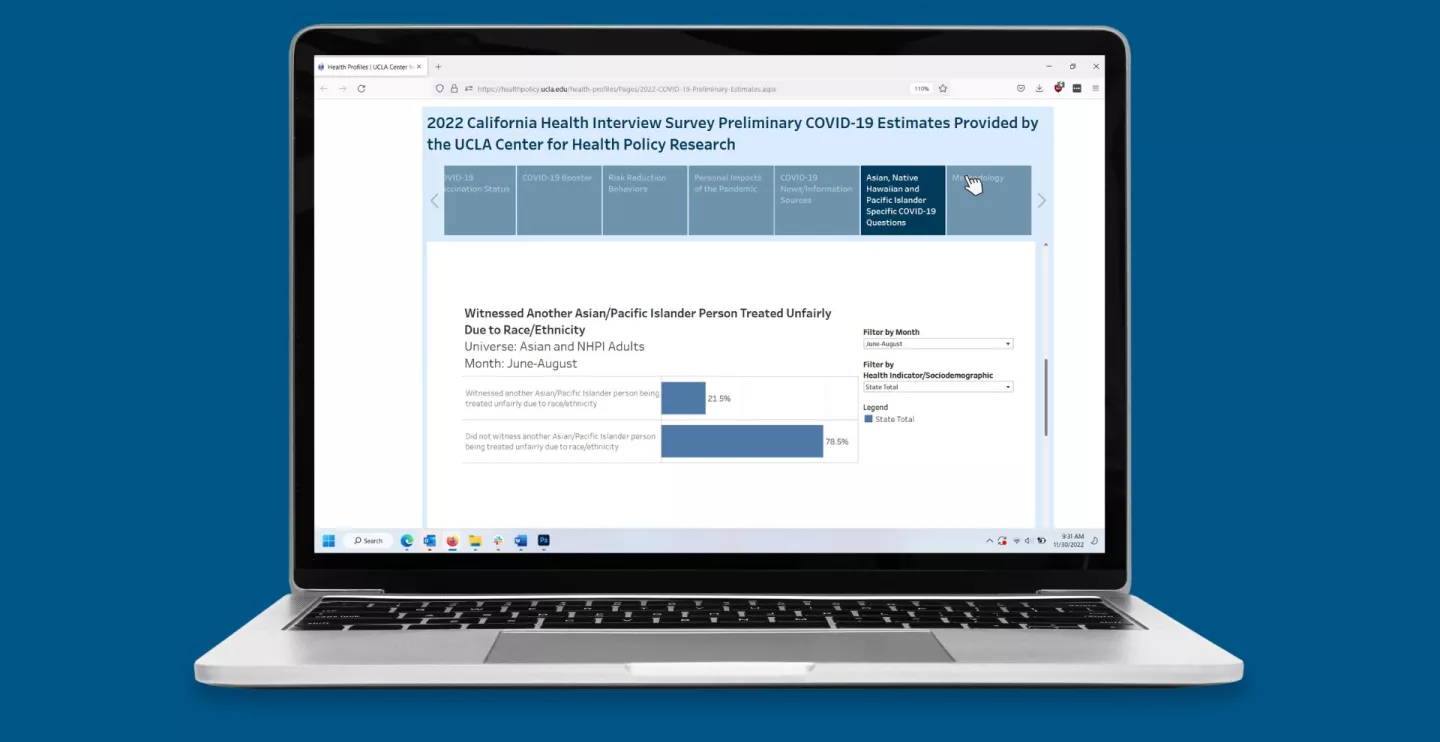Early in the pandemic, the country saw an increase in hate incidents targeting Asian American, Native Hawaiian, and Pacific Islander (AANHPI) communities. According to Stop AAPI Hate, nearly 11,500 hate incidents were reported to their center between March 19, 2020, and March 31, 2022. Today, new data released by the UCLA Center for Health Policy Research (CHPR) show that COVID-related hate incidents continue with about 1 in 13 — or 8% of — Asian Americans, Native Hawaiians, and Pacific Islanders in California said they experienced a COVID-related hate incident during the past year.
The Center’s California Health Interview Survey (CHIS) released estimates from the June–August 2022 CHIS Preliminary COVID-19 Estimates Dashboard, highlighting AANHPI communities’ experiences with COVID, including hate incidents, financial and work challenges, views of the government response to the pandemic, and the state of the country’s education system. Previously released CHIS data from July–September 2020 found that 7% of AANHPIs reported experiencing a COVID-related hate incident.
“More than 1 in 5 Asian American, Native Hawaiian, and Pacific Islander adults in California witnessed another AANHPI person being treated unfairly due to their race and/or ethnicity,” said Ninez A. Ponce, PhD, MPP, UCLA CHPR director and CHIS principal investigator. “That is why it is important this data is seen by policymakers who can take the appropriate actions to put an end to hate incidents across the state.”
CHIS also released estimates that offered insight into the financial and work struggles of the AANHPI community in California. Among adults who had financial difficulties due to the pandemic, more than half (52%) had trouble paying credit card bills and nearly half had trouble paying rent (48%) and utility bills (45%). AANHPIs also had difficulty paying for their insurance (31%), mortgage (29%), and car bills (20%).
Additional findings among AANHPIs, which can also be found in an infographic, include:
Poor internet or lack of computer leads to difficulties performing work
- 1 in 8 (12%) AANHPI adults had difficulty performing work due to poor internet or lack of computer.
Views on government during the pandemic
- 48% of AANHPI adults agree and 12% strongly agree that local government has done a good job managing the COVID-19 outbreak, while 7% disagree and 3% strongly disagree.
- 36% of AANHPI adults agree and 9% strongly agree that the national government had done a good job managing the COVID-19 outbreak, 30% neither agree nor disagree, 16% disagree, and 9% strongly disagree.
The CHIS Preliminary COVID-19 Estimates Dashboard also released early data from August 2022 CHIS, which features responses from all Californians. Findings include:
Mask wearing in California
- 28% of California adults reported “always” wearing a mask when leaving the house, while 19% say they “never” did.
- By location: 37% of California adults in the Greater Bay Area reported “always” wearing a mask when leaving the house, compared to 17% of California adults in the Northern/Sierra counties.
- By race and ethnicity: Nearly half (49%) of Asian Americans reported “always” wearing a mask when leaving the house, compared to 32% of Black or African Americans, 33% of Latinos, and 18% of white Californians who said they always wore a mask.
- By vaccination status: 39% of unvaccinated adults reported they never wore a mask when leaving their house in the past week, compared to 18% of fully vaccinated adults.
Personal and financial impacts of the pandemic
- About 1 in 9 (11%) California adults experienced financial difficulties with basic necessities, such as affording groceries, paying bills, tuition, etc.
- By race and ethnicity: Black or African American adults were twice as likely as white adults to experience financial difficulties with basic necessities — 20% vs. 9%.
- About 1 in 9 (11%) California adults experienced financial difficulties with paying rent or mortgage.
- By race and ethnicity: Latinx adults were twice as likely as white adults to experience financial difficulties with housing — 15% vs. 7%.
- By region: Adults living in the Bay Area were the least likely to experience financial difficulties with housing (5%), compared to adults living in Los Angeles County (12%), Northern/Sierra counties (13%), and the San Joaquin Valley (15%).
- Nearly 1 in 12 (8%) California adults lost their job due to layoffs, business closures, or market changes.
Visit the 2022 CHIS Preliminary COVID-19 Estimates Dashboard.
The UCLA Center for Health Policy Research (CHPR) is one of the nation’s leading health policy research centers and the premier source of health policy information for California. UCLA CHPR improves the public’s health through high quality, objective, and evidence-based research and data that informs effective policymaking. UCLA CHPR is the home of the California Health Interview Survey (CHIS) and is part of the UCLA Fielding School of Public Health and affiliated with the UCLA Luskin School of Public Affairs.




